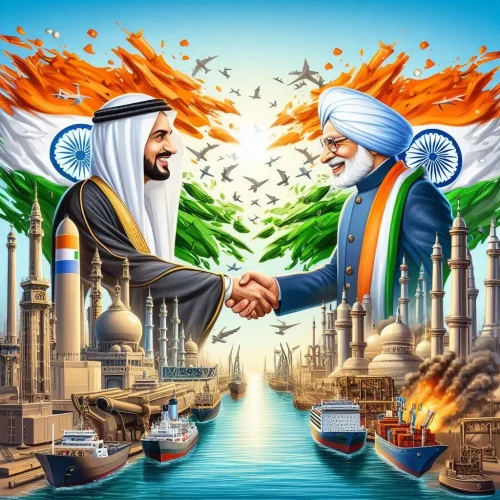The political relations of Kuwait and India have evolved significantly over the years, underscored by extensive diplomatic engagements, strategic agreements, and a mutual commitment to regional stability. This enduring partnership, rooted in shared values and common interests, plays a pivotal role in the geopolitical landscape of both nations.
1. Historical Context of Political Relations of Kuwait and India
1.1 Early Diplomatic Engagements
The political relations of Kuwait and India trace back to shortly after Kuwait gained independence from British rule in 1961. India was among the first countries to recognize Kuwait as a sovereign state, establishing formal diplomatic relations in 1962. This early recognition laid the groundwork for a relationship based on mutual respect, cooperation, and shared aspirations.
1.2 Key Milestones
Throughout the decades, the political relations of Kuwait and India have reached numerous significant milestones. High-level visits by leaders from both countries have been instrumental in reinforcing ties, fostering a spirit of partnership, and enhancing collaboration.
2. Diplomatic Engagements Between Kuwait and India
2.1 High-Level Visits
High-level visits are a cornerstone of the political relations of Kuwait and India. These visits facilitate dialogue on various bilateral issues, including trade, security, and cultural exchanges. Notable examples include:
- The visit of the Emir of Kuwait to India.
- Reciprocal visits by Indian Prime Ministers to Kuwait. These visits underscore the strategic importance both nations place on their relationship.
2.2 Embassy Activities
The embassies of both countries play a crucial role in maintaining and enhancing political relations. The Embassy of India in Kuwait, and the Kuwaiti Embassy in India, work diligently to:
- Promote diplomatic engagements.
- Facilitate cultural exchanges.
- Foster economic cooperation.
- Provide consular services.
- Support expatriate communities.
- Advance the interests of their respective countries.
3. Bilateral Agreements between Kuwait and India
3.1 Trade and Investment Agreements
Bilateral agreements between the two countries cover diverse sectors, including trade, investment, defense, health, and education. Key aspects include:
- Promoting and protecting investments.
- Fostering a conducive environment for economic cooperation and growth.
3.2 Defense Cooperation Agreements
Defense cooperation is another critical component. Both countries have signed agreements that include:
- Joint training exercises.
- Exchange of defense personnel.
- Collaboration in defense technology. These initiatives enhance the security capabilities of both nations and contribute to regional stability.
3.3 Health and Education Agreements
The health and education sectors have also benefited from bilateral agreements. These agreements facilitate:
- The exchange of medical professionals.
- Collaboration in medical research.
- The establishment of educational institutions. Such initiatives improve healthcare and education standards in both countries, reflecting the depth of their political relations.
4. Multilateral Cooperation in Political Relations of Kuwait and India
4.1 United Nations Cooperation
Kuwait and India collaborate on various multilateral platforms, strengthening their political relations. At the United Nations, both countries:
- Support each other’s candidacies for various positions.
- Work together on resolutions that promote global peace and security. This cooperation underscores their commitment to multilateralism and a rules-based international order.
4.2 Regional Platforms
Regionally, Kuwait and India engage through platforms such as the Gulf Cooperation Council (GCC) and the South Asian Association for Regional Cooperation (SAARC). These engagements facilitate dialogue and cooperation on issues affecting the Gulf and South Asia, thereby enhancing their political relations.
5. Cultural and People-to-People Ties in Political Relations of Kuwait and India
5.1 Cultural Exchanges
Events such as cultural festivals, exhibitions, and academic exchanges foster mutual understanding and appreciation of each other’s cultures, strengthening their political relations.
5.2 Expatriate Community
The Indian expatriate community in Kuwait, which numbers over a million, plays a significant role in the bilateral relationship. This community:
- Contributes to Kuwait’s economy.
- Acts as a bridge between the two countries. The Indian government’s efforts to support its diaspora and the Kuwaiti government’s policies to accommodate expatriates reflect the importance of people-to-people ties in their political relations.
Conclusion
The political relations of Kuwait and India are marked by strong diplomatic engagements, comprehensive bilateral agreements, and active cooperation on multilateral platforms. These elements, combined with cultural exchanges and people-to-people ties, form the backbone of their enduring partnership. As both nations continue to navigate global challenges and opportunities, their political relations are poised to grow even stronger, benefiting not only their respective countries but also contributing to regional and global stability.





